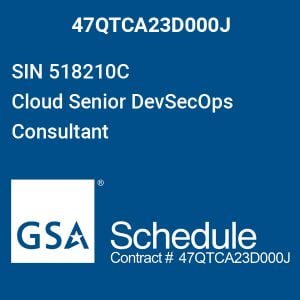Businesses across industries continue to adopt and invest in cloud containers to stay competitive and relevant. Cloud containers help deploy and run containerized applications. AWS, GCP, and Azure are industry-leading cloud-native container service providers that provide helpful resources to help businesses seamlessly manage and handle container complexities.
So, this is a good read if you want to jump onto the container services bandwagon but need more information about these cloud providers and their container-related products. In today’s post, we will provide comprehensive details about container services while comparing the three top service platforms in the industry-GCP, Azure and AWS. These three cloud providers collectively share 64 percent of the market share. Let’s look at all three providers in detail so you can make an informed selection.
Cloud Container – What Is It?
A cloud container can be best described as a software unit that bundles code and all its dependencies into a small and single package. This package enables the application to run efficiently and quickly between different computing environments, such as from a physical data center to a virtual private or public cloud).
A container provides you with everything needed to run applications seamlessly in a single. lightweight package. They don’t run directly on the operating system like virtual machines. Instead, they run on container runtime. If you’re new to the term runtime, let us explain.
A runtime is primarily an instruction set that helps the operating system execute code, making it highly portable. This further speeds up the development and release cycles.
Furthermore, containers are more lightweight than virtual machines, so they can move faster and are more portable. Hence, all these aspects make containers an excellent choice for app development. Moreover, when developing apps with containers, application developers are more confident of their consistency and know that the app environment will be consistent regardless of where it is deployed. Implementation of containers further saves time and energy on diagnosing, deploying, and shipping functionality to end users.
You need container registries to support container clusters and deploy and secure them. The container registry manages different versions of the container image. With Azure, the container registry is called Azure Container Registry. The container registries on Amazon Web Services and Google Cloud Platform are called Elastic Container Registry and GCP Artifact Registry, respectively.
Here it is vital to understand that when apps begin to span over multiple containers across services, it becomes difficult and complex to operate them. Coordinating and scheduling containers and updating them without interruption can be tricky. Therefore, all three container service providers rely on Kubernetes for managed offerings. Kubernetes is the top-notch orchestration tool explicitly designed to automate multiple manual processes associated with containerized app deployment, scaling, and operation.
Unlock the future of intelligent applications with our cutting-edge Generative AI integration services!
Comparison of Cloud Container Services – AWS vs. Azure vs. GCP
All three provide a comprehensive suite of services and products needed for businesses to build, deploy and smoothly manage containerized environments. Amazon Web Service has three versions of managed Kubernetes. They are known as EKS (Elastic Kubernetes Service), ECS (Elastic Container Service), and Fargate. On the other hand, Azure’s managed cloud container service is known as Azure Kubernetes Service, and the Google Cloud Platform version is called Google Kubernetes Engine (GKE). Each of these versions offers its own advantages. Let’s take a deeper dive to see how they compare and differ:
Amazon Web Service – EKS, ECS and Fargate
Though Amazon EKS and ECS have similar integrations, they largely differ in ease of deployment and networking areas. Amazon EKS charges a minimum per cluster every month. So, if you are already running your organization’s workload on Kubernetes, then AWS EKS is a better option for your development team. It will provide them with familiar territory, making integrating and deploying easier. However, if you have never navigated through containers, then AWS ECS is your best bet. It’s simpler to understand and execute than EKS.
On the other hand, Fargate by Amazon Web Service is a serverless compute engine. It is right-sized and provides the on-demand capacity to compute. It helps lower the operational overhead of patching, scaling, managing, and securing servers which empowers DevOps to laser focus on building apps. AWS Fargate is compatible with both Amazon ECS and EKS.
When Amazon’s EKS is compared to Azure and Google’s Kubernetes, Azure’s AKS is inarguably the most cost-efficient option in the market. At the same time, GKE by Google has the most automated capabilities and features. So, if you want a cloud container service with more capabilities, then Google’s Cloud Platform’s GKE is a better option.
Amazon ECS is compatible with other Amazon Web Services. Its auto-scaling feature helps users to scale as needed to meet their dynamic requirements. Moreover, the service also gives the users the power to pay only when computing is essential.
Some other key features of AWS Container Services are that:
- With ECS, users can launch thousands of containers across the cloud with the help of preferred automation or continuous integration delivery tool.
- AWS Fargate gives you the power to optimize time. Use serverless computing for containers to eliminate the need to manage or configure control nodes.
- Users can save nearly 50 percent on their compute costs using pay-as-you-go pricing, auto-scaling, and autonomous provisioning.
Azure AKS
AKS (Azure Kubernetes Services) is a secure, fully-managed, and readily available Kubernetes service. This service enables users to unify their operational and development teams on one platform and then build, scale, and deliver containerized apps confidently.
As this is a fully-managed service, it lowers the operational overhead and complexity while empowering users to manage Kubernetes easily. AKS provides the fastest way to develop and deploy cloud-native applications using built-in code to cloud pipelines. Furthermore, with AKS, you also get unified governance and management for multi-cloud and on-premises Kubernetes clusters. So, AKS (Azure Kubernetes Service) may be a suitable option for innovating, operating, and deploying Kubernetes seamlessly. Moreover, you can easily interoperate using Azure identity, security, migration, and cost management services.
AKS also makes it incredibly easy for users to lift and migrate their applications to containers and run them in a fully managed AKS Kubernetes service. Additionally, by implementing DevOps, you can achieve the balance between security and speed while delivering codes faster.
Cloud Container Services by GCP
GCP offers two types of cloud container services. These include Google Kubernetes Engine and Google Cloud Run. Let’s take a look at both separately:
GKE (Google Kubernetes Engine)
GKE creates a managed environment for managing, deploying, and scaling containerized apps with the help of Google infrastructure. Rest assured, when using Google Kubernetes Engine, Google Site Reliability Engineers monitor and manage your Kubernetes control panel. Furthermore, Google Site Reliability Engineers successfully monitor the clusters and their computing, storage, and networking. The GKE support gives the internal engineers adequate time to focus on app development.
Google Cloud Run (GCR)
GCR enables users to develop, create and deploy scalable containerized apps on a managed serverless platform. The platform allows users to deploy HTTTP containers seamlessly. Developers have the power to:
- Choose a programming language
- Remove associated overheads using resource provisioning
- Easily pair with GKE or Docker (as needed)
Comparing the serverless container services by all three cloud platforms, we see that Google Cloud Run is built on Knative. Knative is another Google technology. This technology doesn’t give Google Cloud Run the capabilities to scale to zero or autoscale out of the box. Likewise, Amazon Web Service Fargate also requires configuration between different cloud services of Amazon Web Services.
However, if we compare them for security, Cloud Run provides less isolation for workloads, while AWS Fargate and Azure ACI can isolate their workloads at the VM (virtual machine) level. Most organizations that are security-sensitive are more comfortable with it.
Although Google Cloud Run (GCR) isn’t feature-rich, it scores high on the app developer experience. It is easier to access the service. However, Fargate offers architect developers more flexibility using several services provided by Amazon Web Service.
Pricing Comparison
When discussing containerized workloads and cloud computing, pricing is a point of debate. When we look at the Kubernetes products’ raw control plane cost across cloud service providers, we see that until 2020, the control plane could run for free while EKS costs users $0.20/hour.
However, both competitors Amazon and Google shifted their pricing by ten cents per hour to offer their services at the same price, but Microsoft’s Azure AKS was available for free. But uptime SLA for AKS Kubernetes API server is available at $0.10/cluster.
| AWS Fargate | Azure ACI | Google Cloud Run (GCR) | |
| VCPU/hour | $0.04048 | $0.00468 | $0.0864 |
| GB/hour | $0.004445 | $0.04068 | $0.009 |
The main cost is associated with worker nodes running in the clusters. Please note that the pricing of the clusters is quite complex. Here’s a quick overview of the serverless container service cost for all three industry players:
Setup and Maintenance
Indeed the cost of using cloud container services is more than what’s written on the rate card. Yes, here we are referring to the total cost of ownership too. This cost covers the setup and maintenance costs which can often skyrocket.
Once again, maintenance and setup can be complicated. Therefore it is advisable to select your options based on your situation. For example, select a service provider whose strength aligns with the needs of your business.
However, if we consider all three industry players on ease of setup alone, Google Cloud Platform comes out strong. Google has a stellar market reputation for offering sophisticated yet user-friendly services. This relative ease may mainly exist because Google container services are not mature compared to Amazon Web Service offerings. In contrast, setting up AWS is slightly tricky.
AWS container services must conform to and integrate with numerous other legacy systems. However, the good news is that Amazon Web Services are catching up fast. They have introduced several supporting tools, such as Terraform, which focuses on preventing this challenge and facilitating the ease of setup.
Besides the setup, if we compare the three container services providers on maintenance and Auto-scaling, Google takes the lead. This area is yet another one where Google is strong. Auto-scaling the worker nodes on GKE requires minimal configuration from the user’s end compared to Azure and Amazon Web Services. Both of the latter services require complex configurations, which can be frustrating if you’re not technically sound.
Performance
Now let’s compare the performance of all three service providers for cloud container services. Performance analysis presents a mixed picture. The container workload performance is directly linked to the performance of the cloud service provider’s infrastructure, like disk speed and network.
Cockroach Labs ran network and TCP-C performance tests and compared all three (AWS, Azure, and GCP). They released their report called Cloud Report 2020, listing their findings. The key findings on performance comparison included:
GCP beat AWS for network performance. Azure came third and significantly had the worst network latency.
In terms of I/O write throughput, Amazon Web Service had the best performance, followed by Azure.
Likewise, AWS secured the top spot for I/O read storage throughput, followed by Azure and GCP. However, the area where Google Cloud Platform edged AWS and Azure was TPC-C performance.
The report concluded that as the cloud container service providers are consistently upgrading their infrastructure, it is difficult to provide definitive recommendations for container performance.
Market Position, Establishment, and Availability Zones – Azure, Google Cloud Platform, and Amazon Web Services
Here’s a look at all three cloud service providers in terms of establishment, market position, and availability zones.
AWS
Launched in 20006, Amazon Web Services (AWS) is a subsidiary of Amazon.com. The platform offers cloud container services based on paid subscriptions to individuals, governments, and organizations across industries. AWS is the market’s most experienced and mature cloud container services provider, with an ever-increasing consumer base built on reliability and trust.
Currently, AWS is hosting its cloud services in multiple locations globally. The AWS cloud computing platform has nearly 66 availability zones. Among AWS’s well-known and high-profile customers are Netflix, Coca-Cola, Formula 1, FDA (Food and Drug Administration), Airbnb, BMW, Unilever, Gameloft, and Samsung, among others.
Azure
Azure is by Microsoft. It was launched in 2010- four years after Amazon Web Services. The primary goal of Azure was to serve as an exemplary cloud computing platform. Today, Azure is one of the fastest-growing platforms for cloud services. It has a far greater market reach than AWS. Azure by Microsoft is available in 54 regions and nearly 140 countries. Azure’s customer profile features brands like Apple, HP, Starbucks, Honeywell, Walgreens, National Health Service (UK), CDC (Center of Disease Control) in the US, and Johnson Controls.
Google Cloud Platform (GCP)
GCP is a cloud container service provided by Google. The Google Cloud Platform provides cloud computing services on the same architectural infrastructure it uses for its internally end-user products. GCP was launched in 2011. It offers more than 100 services. Google Cloud Platform is the smallest cloud container service provider compared to Azure and AWS. Currently, it is available in 20 regions globally. Notable GCP customers include Toyota, Spotify, Nintendo, Dominos, HSBC, Target, PayPal, eBay, Etsy, and the Home Depot.
Key Cloud Tools Comparison
As the competition to gain leadership in public cloud computing gets tougher among the top three industry players, we are now looking at some amazing key cloud tools, and more are yet to come.
AWS Cloud Tools
DeepLens by AWS is one of its most advanced key cloud tools, making its container services popular among users. DeepLens is an AI-powered camera that allows users to develop and deploy ML algorithms for object recognition and OCR (optical character recognition). Other key cloud tools include SageMaker, Greengrass IoT, LEX conversational interface, and Lamda serverless computing service.
Microsoft Azure Cloud Tools
Azure invests mostly in artificial intelligence and machine learning. Azure offers many cloud tools: Bing Web Search, Computer Vision, Face API, Custom Vision Service, and Text Analytics API. Besides these tools, Azure also has numerous analytics tools and on-premises support tools.
GCP Cloud Tools
The industry leader in artificial development is Google Cloud Platform, with tools like TensorFlow. This open-source and free software program helps developers build AI and ML apps. Moreover, it can be used across different tasks.
Hybrid and Multi-Cloud Offerings
Kubernetes can easily be deployed on all cloud platforms and at on-premises data centers. Hence, it provides the perfect option between PaaS and IaaS, helping businesses work efficiently in the multi-cloud and hybrid environment without limitation.
The good thing is that all three cloud container service providers (AWS, Azure, and GCP) offer support for hybrid and multi-cloud environments. Here’s a quick overview to help you better understand how they work and support multi-cloud and hybrid environments:
Azure Arc by Microsoft Azure is excellent for smoothly managing hybrid Kubernetes deployments. With Azure Arc, you can easily manage:
- Servers
- Kubernetes clusters
- SQL servers
- Azure data services
Amazon EKS helps users to create, deploy and operate clusters of Kubernetes. These can be deployed on user infrastructure. They are supported by Amazon Web Service.
Likewise, Google Cloud Platform offers Anthos as their hybrid and multi-cloud offering. Anthos is built around Kubernetes, enabling users to run GKE on both on-premises data centers and cloud machines. Once integrated, Google consistently manages your apps in the hybrid environment with a single control plane.
Using Anthos, you can migrate directly from VMs, and deploy, build, and optimize applications on GKE. Anthos provides serverless landing zones for users to build and deploy apps with simplicity, sheer flexibility, and complete security. Therefore, with GCP Anthos, users can enjoy consistent operations and deployment for hybrid and multi-cloud environments.
Furthermore, with GCP Anthos, you can also speed up your VM-based application migration journey to cloud containers. Apart from Anthos, other tools in GCP multi-cloud and hybrid offerings are Cloud Build, Operations, Looker, Cloud Run, Traffic Director, and more.
AWS, Azure, and GCP- Which of the Three Is the Best?
All three are top cloud container service providers. They offer a wide array of services to boost productivity and performance. Therefore, which of them is the best one largely depends on your needs and budget.
For example, if you’re a startup with a tight budget and limited resources, then GCP may be your best bet. Google Cloud Platform is an ideal option for startups with a small budget because GCP provides many user discounts. Compared with Azure and AWS, Azure provides pay-per-minute billing while Amazon Web Service charges hourly.
Azure’s short-term subscription plans are more flexible but more expensive. The company offers only up-front options. Hence, it can help you transition to the cloud while being easy on the pocket.
Likewise, if you’re looking for unmatched flexibility, AWS (Amazon Web Service) is the clear winner. AWS provides numerous services and has a global reach. It is a mature platform with more capital, better infrastructure, and scalable services.
Conclusion
In a nutshell, there is no clear choice among the three cloud container service providers. All three — AWS, Azure, and GCP — have pros and cons. Therefore, you must first clearly define what matters to you to evaluate and compare the three factors and make the best selection.
Further blogs within this Cloud Container Services Comparison of AWS, Azure, and GCP category.




